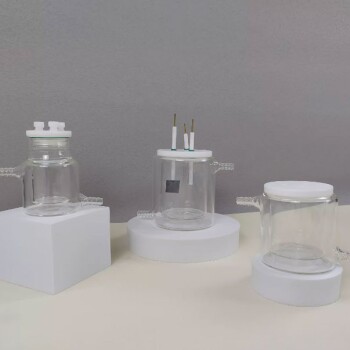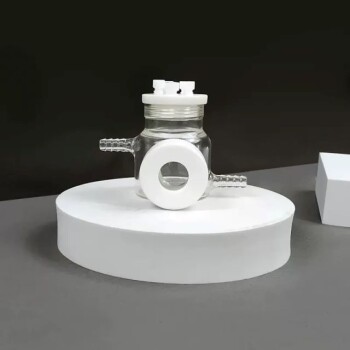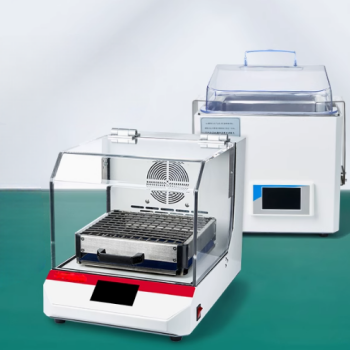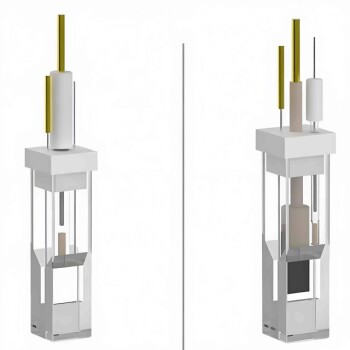From a technical standpoint, pyrolysis benefits the environment by transforming low-value waste materials into valuable products like biofuels and biochar. This process significantly reduces pollution and greenhouse gas emissions compared to conventional disposal methods like landfilling or direct incineration.
The core environmental strength of pyrolysis lies in its multi-faceted approach. It simultaneously addresses waste management, creates renewable energy, reduces air pollutants, and provides a unique pathway for long-term carbon sequestration.
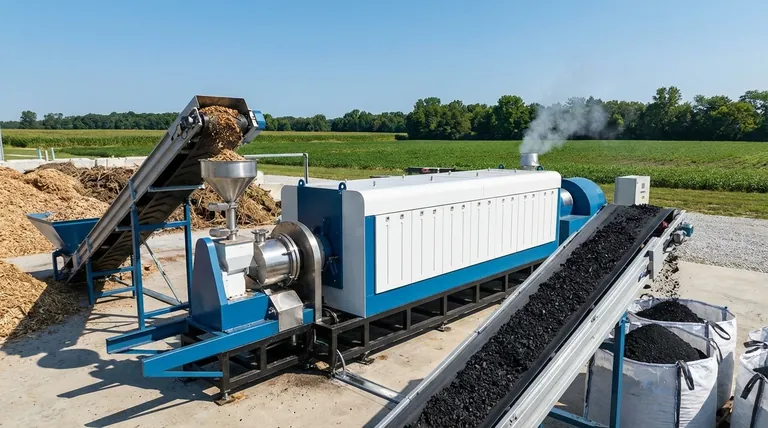
Transforming Waste into a Valuable Resource
The primary benefit of pyrolysis is its ability to reframe our concept of "waste." It is a thermochemical decomposition process that heats organic material in an oxygen-absent environment, breaking it down rather than burning it.
Diverting Waste from Landfills
Pyrolysis can process a wide range of organic wastes, including agricultural residues, wood processing waste, and even certain plastics and municipal solid waste. This diverts enormous volumes of material from landfills, where they would otherwise decompose and release methane, a potent greenhouse gas.
Creating High-Energy Fuels
The process converts low-energy-density solid biomass into high-energy-density liquid fuels, commonly known as bio-oil, and a combustible gas called syngas. These products can be stored, transported, and used to generate heat and power, providing a renewable alternative to fossil fuels.
Recovering Raw Materials
Beyond fuel, pyrolysis enables the recovery of valuable materials from complex waste streams. This reduces the environmental impact and economic cost associated with extracting and processing virgin raw materials.
The Unique Advantage: Carbon Sequestration
While many technologies focus on reducing emissions, pyrolysis offers a direct method for removing carbon from the atmosphere and storing it for the long term.
The Role of Biochar
A key solid product of pyrolysis is biochar, a stable, carbon-rich charcoal-like substance. Unlike the original biomass, which decomposes and releases its carbon back into the atmosphere, biochar is highly resistant to decomposition.
Locking Carbon in the Soil
When biochar is added to soil, it acts as a form of carbon sequestration. The carbon within the biochar is effectively locked away for hundreds or even thousands of years, representing a net removal of carbon dioxide from the atmospheric cycle.
Reducing Emissions and Improving Air Quality
Compared to direct burning (incineration), pyrolysis offers a much cleaner operational profile. This is due to the controlled, oxygen-free environment in which it operates.
Cleaner Than Direct Combustion
Because there is no combustion, the formation of many pollutants is avoided. The process uses anoxic (oxygen-deficient) layer heating, which results in significantly lower emissions of particulate matter and soot.
Minimizing Harmful Pollutants
Biomass feedstocks are naturally low in sulfur, leading to minimal sulfide emissions. The controlled heating process also produces far lower concentrations of nitrogen oxides (NOx) and carbon monoxide compared to open burning or incineration, helping to protect local air quality.
Understanding the Trade-offs and Considerations
No technology is an environmental panacea, and a clear-eyed assessment of pyrolysis requires acknowledging its limitations. Being "good for the environment" depends entirely on responsible implementation.
The Source of the Feedstock
The environmental benefit is only realized if the feedstock (the input material) is genuinely waste or a sustainably harvested resource. Using dedicated energy crops grown on land that could otherwise be used for food or conservation can create negative environmental consequences.
The Energy Balance
The pyrolysis process itself requires an energy input to generate the necessary high temperatures. A system is only truly beneficial if it produces significantly more energy than it consumes, a concept known as a positive net energy balance. Modern systems often use the syngas produced during the process to power themselves, making them self-sustaining.
Potential Contaminants
If the feedstock is contaminated with heavy metals, chemicals, or other non-organic materials, these can become concentrated in the resulting bio-oil or biochar. This necessitates careful sorting of input waste and rigorous testing of the outputs to avoid soil or air contamination.
Making the Right Choice for Your Goal
To assess the value of pyrolysis, it is critical to align the technology with a specific environmental objective.
- If your primary focus is waste management: Pyrolysis is an exceptional tool for diverting organic and plastic waste from landfills, reducing methane emissions and recovering value.
- If your primary focus is climate change mitigation: The production of biochar for carbon sequestration is the most powerful and unique benefit pyrolysis offers for long-term atmospheric carbon removal.
- If your primary focus is renewable energy: Pyrolysis efficiently converts scattered, low-density biomass into easily transportable liquid and gas fuels that can displace fossil fuels.
By understanding its mechanisms and applying it thoughtfully, pyrolysis serves as a powerful and flexible tool in building a more circular and sustainable economy.
Summary Table:
| Environmental Benefit | How Pyrolysis Achieves It | Key Outputs |
|---|---|---|
| Waste Reduction | Diverts organic/plastic waste from landfills | Bio-oil, Syngas |
| Carbon Sequestration | Creates stable biochar that locks carbon in soil | Biochar |
| Cleaner Air | Anoxic process minimizes pollutants (NOx, soot) | Renewable Fuels |
| Resource Recovery | Recovers valuable materials from waste streams | Recovered Materials |
Ready to turn your waste streams into environmental and economic value? KINTEK specializes in advanced pyrolysis equipment and solutions for laboratories and research facilities. Our systems are designed to help you efficiently convert biomass and waste materials into renewable energy and sustainable products like biochar. Contact our experts today to discover how pyrolysis can be integrated into your sustainability and research goals.
Visual Guide
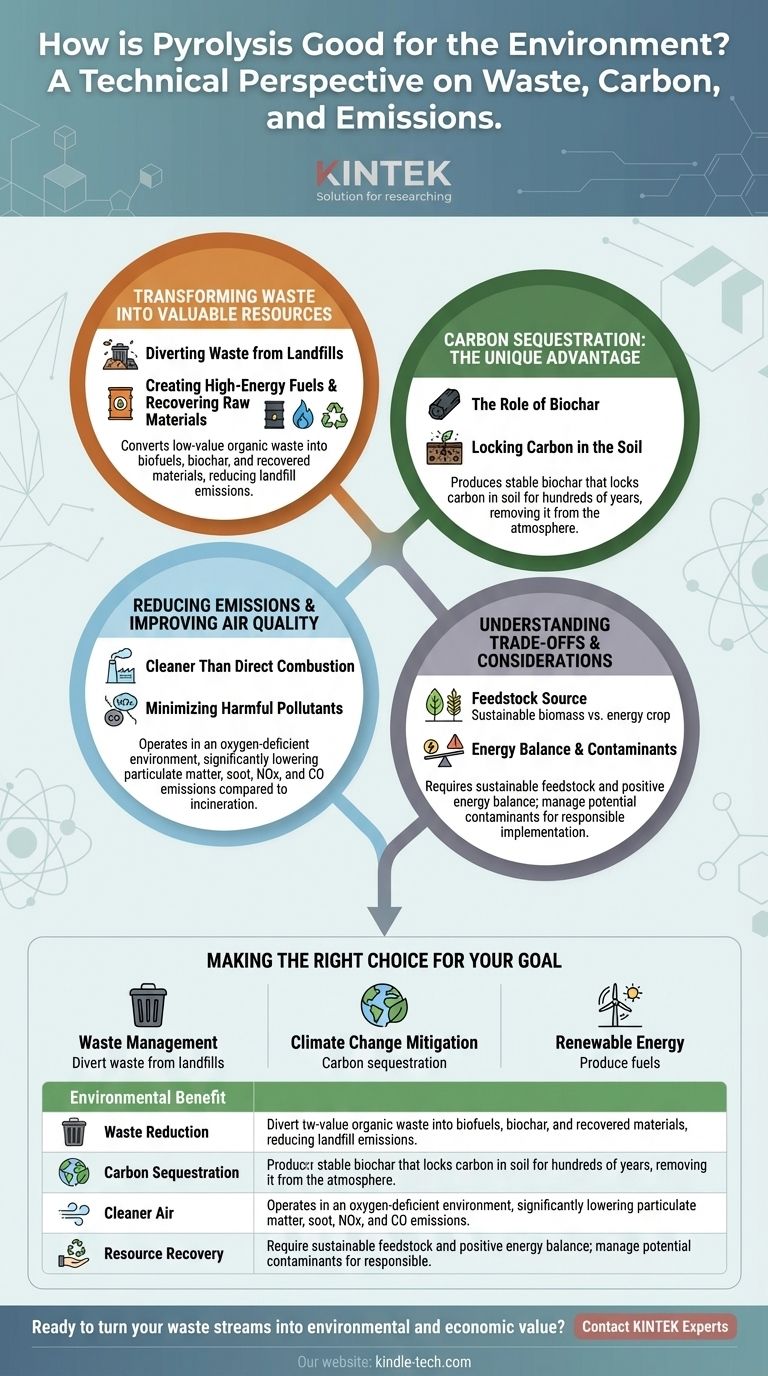
Related Products
- Electric Rotary Kiln Small Rotary Furnace Biomass Pyrolysis Plant
- Electric Rotary Kiln Continuous Working Small Rotary Furnace Heating Pyrolysis Plant
- Vacuum Sealed Continuous Working Rotary Tube Furnace Rotating Tube Furnace
- Customizable High Pressure Reactors for Advanced Scientific and Industrial Applications
- Mini SS High Pressure Autoclave Reactor for Laboratory Use
People Also Ask
- What is the operational mechanism of a high-temperature pyrolysis furnace? Expert Guide to Coconut Shell Carbonization
- What is fast and slow pyrolysis? Choosing the Right Biomass Conversion Process
- What are the materials suitable for pyrolysis? Unlocking Value from Waste Streams
- What are the uses of pyrolysis machine? Turn Waste into Fuel, Chemicals, and Soil Amendment
- What are the advantages of spray pyrolysis? Achieve Cost-Effective, Scalable Thin Film Production
- How is slow pyrolysis done? A Step-by-Step Guide to Efficient Biochar Production
- What is the effect of temperature on calcination? Master Precise Heat Control for Material Properties
- What is the difference between pyrolysis and torrefaction? Choose the Right Biomass Conversion Process









